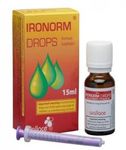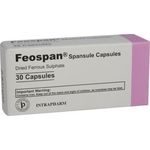Ferrous Sulfate Seminar I: Suli Pharma
←
→
Page content transcription
If your browser does not render page correctly, please read the page content below
University of Sulaimani
College of Pharmacy
Clinical pharmacy department
Pharmacy practice experience (PPE)
Seminar I:
Ferrous Sulfate
Supervised by: Dr. Chra Salahalddin Ahmed salim
Prepared by: Sham Abdalkhaliq
Lavin Akram
Dene Mustafa
Bayan Hoshyar
Yar Muhammed Faqi
Fourth stage
subgroup E
1|PageFerrous Sulfate
Iron (II) sulfate or ferrous sulfate (or sulphate) denotes a
range of salts with the formula FeSO₄·xH₂O. Known as iron
pills, Iron supplements may be taken as capsules, tablets,
chewable tablets, and liquids.
Indication:
Ferrous Sulfate (Rx, OTC) is an essential body mineral,
used as medicine to treat and prevent iron deficiency
anemia (a lack of red blood cells caused by having too little
iron in the body). And recommended for prevention of
heavy menstrual periods, pregnancy, hemodialysis, poor
absorption, diet low in iron. also be used in low-birth-weight babies.
Iron helps the body to make healthy red blood cells, which carry oxygen
around the body. Some condition such as blood loss, pregnancy or too little
iron in diet can make iron supply drop too low, leading to anemia.
Ferrous sulfate comes as tablets, or as drops also There are modified-release
tablets and capsules of ferrous sulfate, but they may not be absorbed as well.
It's available on prescription and to buy from pharmacies (as
OTC)
Ferrous sulfate is generic name and may also
be called by the brand names Feospan,
Ferrograd, and Ironorm Drops,
but the brand name that was available in the pharmacy that we
practiced in was ferrous
sulfate oral coated tablet
(DINAMICS
HEALTHCARE INC.
USA)
2|PageIron support ongoing energy by helping enough oxygen to reach cells. iron is
needed for muscle movement because it helps store of oxygen in the muscles
that allows them to move and strengthen, if iron is not present, the brain
doesn’t receive the oxygen it needs. So, it is important for Brain functions, for
Healthy pregnancy: not only doses a mother to be require iron, but she also
needs to meet the needs of the fetus and placenta, low iron levels are known to
play a role in the occurrence of restless leg syndrome.
Dosage Forms & Strengths
oral solution
- 220mg (44mg Fe)/5mL
- 300mg (60mg Fe)/5mL
- 15 mg elemental Fe/mL
Tablet
- 45mg elemental Fe
- 200mg (65mg Fe)
- 300mg (60mg Fe)
- 325mg (65mg Fe)
oral liquid drops
- 75mg (15mg Fe)/mL
tablet, delayed release
- 325mg (65mg Fe)
tablet, extended release
- 160mg (50mg Fe)
- 142mg (45 mg Fe)
- 140mg (45 mg Fe)
drops and solution may be easier for children and people who find it difficult
to swallow tablets, the dose of ferrous sulfate depends on the reason for taking
it and whether getting tablets, capsules or drops.
For children under the age of 18 years, the doctor will use the child's age,
weight and blood results to work out the right dose.
3|PageIron-deficiency anemia (therapeutic)
BY MOUTH USING TABLETS
- Child 6–17 years: 200 mg 2–3 times a day
- Adult: 200 mg 2–3 times a day
DROPS
- Adult: 4ml, taken once or twice a day
Iron-deficiency anemia (prophylactic)
BY MOUTH USING TABLETS
- Child 6–17 years: 200 mg daily (taken once a day)
- Adult: 200 mg daily (taken once a day)
DROPS
- Adult: 2.4ml to 4.8ml daily
Most people begin to feel better after taking ferrous sulfate for 1 week, but it
may take up to 4 weeks to take full effect
Tablets should be taken before meals or during meals, depending on
gastrointestinal tolerance
Side effects:
Like all medicine, ferrous sulfate can cause
side effects in some people.
Many people have no side effects or only
minor ones
▪ Common side effects: constipation, dark
stool, abdominal pain, diarrhea, feeling or
being sick (nausea or vomiting), loss of
appetite, stomach pain or heartburn,
▪ Serious allergic reaction in rare cases it's
possible to have a serious allergic reaction
(anaphylaxis) to ferrous sulfate.
4|Page▪ Excessive use cause iron overload and iron toxicity, the patient may notice
that his/her stools become black or dark. This is completely harmless, but
patients must be warned about this to avoid unnecessary concern.
▪ When iron supplements are given in a liquid form, (from the drops), teeth
may reversibly discolor and black stained
▪ Intramuscular injection can be painful, and brown discoloration may be
noticed. taken after meals decreases side effects but increased risk of other
substances interaction. Side effects are dose-dependent, and the dose may
be adjusted.
Patient counselling information:
▪ Ferrous sulfate is best absorbed and work best
when taken on an empty stomach. However, it
may be needed to take iron with, or just after a
small amount of food, a meal or snack. Stick to
simple meals and do not eat rich or spicy food to
avoid these problems: stomach cramps or aches,
nausea, and diarrhea in some people.
▪ Do not take a double dose to make up for a
forgotten dose, if often forget doses, it may help
to set an alarm to remind, if you forget a dose, take another as soon as you
remember. If it's almost time to take the next dose, then do not take the
missed dose at all.
▪ Swallow the tablet or capsule whole with a glass of water. Do not suck,
chew or keep the tablet in your mouth as this can cause mouth ulcers or
stain your teeth
▪ Milk, calcium and antacids should NOT be taken at the same time as iron
supplements. Patient should wait at least 2 hours after having these foods
before taking their iron supplements.
▪ Foods that should NOT eat at the same time as taking ferrous sulfate
include:
1- High fiber foods, such as whole grains, raw vegetables, and bran
2- Foods or drinks with caffeine
5|Page▪ a doctor (or a pharmacist) may suggest taking a vitamin C supplement or
drinking orange juice with your iron pill. This can help increase the
amount of iron absorbed by the body. Drinking 8 ounces (240 milliliters) of
fluid with an iron pill is also OK.
▪ Keep tablets in a cool place. (Bathroom medicine cabinets may be too
warm and humid, which may cause the pills to fall apart.
▪ Get emergency medical help if you have any of these signs of an allergic
reaction: hives; difficulty breathing; swelling of your face, lips, tongue, or
throat
▪ Keep iron supplements out of the reach of children. If your child swallows
an iron pill, contact a poison control center right away.
▪ It's usually safe to take ferrous sulfate during pregnancy and it's usually
safe to breastfeed while taking ferrous sulfate.
▪ To avoid black stained teeth:
- rinse your mouth with water after taking the drops
- Try mixing the iron with water or other liquids (such as fruit juice or
tomato juice) and drinking the medicine with a straw.
- Iron stains can be removed by brushing your teeth with baking soda or
peroxide through the use of a straw).
▪ Do not take it with tea, coffee, eggs, dairy products and soybean products,
as they can reduce the amount of iron that gets into your system.
▪ If the patient taking ferrous sulfate as drops, it will come with a plastic
syringe or dropper to help patient measure out the right dose. If not having
one, patient should ask a pharmacist for one. And Don’t use a kitchen
teaspoon as it will not give the right amount of medicine.
▪ To avoid constipation as side effect advise them to – eat more high-fiber
foods such as fresh fruit, vegetables and cereals, and drink plenty of water.
Try to exercise more regularly, for example, by going for a daily walk or
run.
6|Page▪ To prevent diarrhea – drink lots of fluids, such as water or squash, to avoid
dehydration. Signs of dehydration include peeing less than usual or having
dark strong-smelling pee. Do not take any other medicines to treat
diarrhea without speaking to a pharmacist or doctor.
▪ There are some medicines that may interfere with how ferrous sulfate
works. Ferrous sulfate can also affect the way other medicines work. It is a
good idea to leave a gap between taking the other medicine and ferrous
sulfate. Some medicines should not be taken for 2 hours before or after
taking ferrous sulfate. drugs Such us supplements or multivitamins
containing iron, calcium, magnesium or zinc, or already receiving iron
injections, antibiotics, antivirals, bisphosphonates, cholestyramine,
levothyroxine, levodopa, carbidopa or entacapone, mycophenolate,
methyldopa, penicillamine,
▪ the patient should tell the doctor before taking ferrous sulfate to make sure
it's safe for them if they:
✓ have had an allergic reaction to ferrous sulfate or any other medicine in
the past or have a different type of anemia that is not caused by low
levels of iron
✓ have any other conditions that affect iron levels, such as
haemochromatosis or hemosiderosis or have a condition that affects red
blood cells, such as sickle cell anemia or thalassemia
✓ have a stomach ulcer, have had all or part of stomach removed, or have
other stomach or bowel problems such as inflammatory bowel disease
✓ are receiving repeated blood transfusions or have noticed blood in urine
✓ have been diagnosed with an iron deficiency and are already receiving
treatment for this
7|PageReferences:
1. Zoe Tolkien, Lynne Stecher, Adrian P. Mander, Dora I. A. Pereira,
Jonathan J. Powell, Ferrous Sulfate Supplementation Causes
Significant Gastrointestinal Side-Effects in Adults: A Systematic Review
and Meta-Analysis, PLOS ONE, 2015 Feb 20;10(2)
2. L I Dvoretsky , [Ferrous sulfate in the treatment of iron deficiency
anemia: The positions continue], Ter Arkh, 2017;89(10):108-112.
3. Slow FE, Fer-In-Sol (ferrous sulfate) dosing, indications, adverse effects,
and more [online] Available at:
https://reference.medscape.com/drug/slow-fe-fer-in-sol-ferrous-sulfate-
342161 [Accessed 10th April 2021].
4. Joint Formulary Committee, BNF (British National Formulary) 78
September 2019– March 2020, 78th Revised edition, Pharmaceutical
Press; 1019-1024
5. Minhthao Nguyen; Prasanna Tadi, Iron Supplementation, StatPearls
2021 Jan
8|PageYou can also read



























































